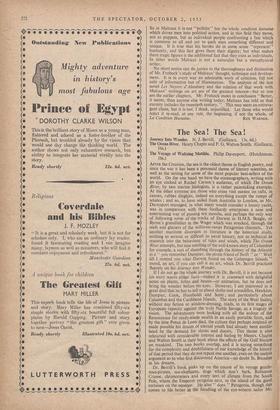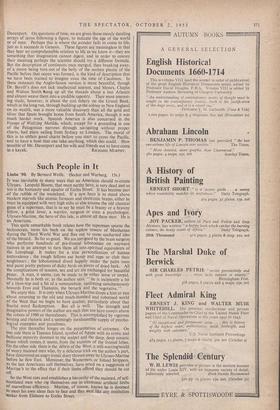The Sea! The Sea!
Journey Into Wonder. N. J. Berrill. (Gollancz. 13s. 6d.) AFTER the Creation, the sea is the oldest theme in English poetry, and since the war it has been a perennial theme of literary scientists, as well as the setting for some of the most popular best-sellers of the world. On the one hand we have the oceanographers., writing with an eye cocked at Rachel Carson's audience, of which The Ocean River, by two marine biologists, is a rather painstaking example. At the other extreme are those who cross vast oceans on rafts, in canoes, rubber dinghies, indeed on everything except the rumps of whales ; and so, to have sailed from Australia to London, as Mr. Davenport managed, in what many would consider a luxury yacht, was in comparison with these foolhardy enterprises a sane and entertaining way of passing ten months, and perhaps the only way of following some of the tracks of Darwin in H.M.S. Beagle, or Byron's grandfather in the Wager which was wrecked, through the reefs and glaciers of the williwaw-swept Patagonian channels. Yet another maritime diversion in literature is the historical study, nothing so serious or difficult as naval history, nor as technical as research into the behaviour of tides and winds, which The Ocean River attempts, but nice retelling of the well-known story of Columbus for example, a sort of thumbing through the history of the Atlantic in a " you remember Dampier, the pirate ffiend of Swift " or " Wait till I, remind you what Darwin found on the Galapagos Islands " mood, an art, if you can call it an art, which Dr. Berrill practices fluently on his Journey into Wonder.
If I do not go the whole journey with Dr. Berrill, it is not because his story wants either facts—indeed it is crammed with delightful notes on plants, fishes and beasts—or animation, but he does not bring the wonder before my eyes. However, I am interested in a great deal that he has to tell us about sloths and armadillos, Hawkins, Dampier, Cook, Humboldt and Scott ; and particularly about Columbus and the Caribbean Islands. The story of the West Indies, without any fiction or window-dressing, reads, in its first stages of European rapacity against the truly Noble Savage, as a tragedy in vision. The adventurers were looking with all the ardour of the Renaissance for ready-made wealth in an easily portable form, and by the time Ponce de Leon died, the culture that perhaps inspired or made possible his dream of eternal youth had already been annihi- lated by the demand for slaves and ducats. This theme is also rehearsed with considerable interest and feeling by Messrs. Chapin and Walton Smith in their book about the effects of the Gulf Stream on mankind. The two books overlap, and it is saying something for the complexity and doubtfulness of our knowledge of the history of that period that they do not repeat one another, evenon the useless argument as to who first discovered America—no doubt St. Brendan in his dreams.
Dr. Berrill's book picks up on the course of its voyage gentle- man-pirates, sea-elephants, dogs which don't bark, Robinson Crusoe, chronometers and every sort of climate from the South Pole, where the Emperor penguins nest, to the island of the giant tortoises on the equator. He also " does " Patagonia, though this comes to life better in the handling of the eye-witness sailor Mr.
Davenport, On questions of time, we are given those merely dazzling arrays of zeros following a figure, to indicate the age of the world or of man. Perhaps this is where the wonder fails to come to life, just as it succeeds in Genesis. These figures are meaningless in that they bear no comprehensible relation to life as we know it—they are something that imagination cannot digest, and in order to convey their meaning perhaps the scientist should try a different formula. But the description of continents once merged, then breaking away, of a moon being torn out of the belly of the molten plastic of the Pacific before that ocean was formed, is the kind of description that we have been trained to imagine since the time of Caedmon. In these instances the Anglo-Saxon version is more beautiful, though Dr. Berri11's does not lack intellectual interest, and Messrs. Chapin and Walton Smith 4tang up all the threads about a lost Atlantis and almost weave them into a credible tapestry. Their most interest- ing study, however, is about the cod fishery on the Grand Bank, which in the long run, through building up the colony in New England on its wealth, was a more valuable discovery than all the gold and silver that Spain brought home from South America, though it was much harder work. Spanish America is also concerned in the Voyage of Waltzing Matilda, which, except for a grounding in one of the Patagonian narrows through navigating without proper charts, had plain sailing from Sydney to London. The moral of this is to obtain good charts before you start to cross the Pacific, and to have a boat that can take anything, which this could. How sensible of Mr. Davenport and his wife and friends not to have come



















































 Previous page
Previous page